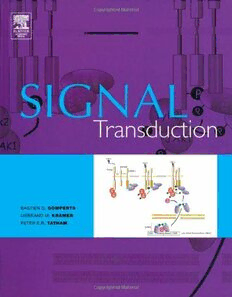
Signal Transduction PDF
441 Pages·2002·31.666 MB·English
Most books are stored in the elastic cloud where traffic is expensive. For this reason, we have a limit on daily download.
Preview Signal Transduction
Description:
The authors intended this book for students and professionals. I don't fall into either group but I enjoyed it and learned from it, so I'm reviewing it for other similarly inclined non-scientists.
Cell-to-cell communication is of supreme importance to multicellular organisms and so it is of interest from many points of view. For example, I am very interested in its role in evolutionary developmental biology. Other people will be more interested in hormones, nerve signaling, et al. Signal Transduction is that part of communication that happens inside the cell, between the signal and the DNA. Thus it doesn't include neurotransmitters which activate ion channels in the membrane, nor does it include steroids, which pass through the membrane and into the nucleus. Nevertheless, it covers most cell communication. In particular, there is a lot of material on G-protein-coupled receptors, which make up a majority of the receptors, and tyrosine kinase receptors, which are also plentiful.
As the authors describe it, chapters 1-9 are on the "nuts and bolts" of transduction. This includes a very brief introduction to intercellular signaling molecules (such as hormones and neurotransmitters) and receptors, followed by some details about the internals, including calcium ions and phosphate exchange. In the second part, "attention is concentrated on transduction processes set in action by growth factors and adhesion molecules". There is also a short section on insulin. This part fills in the chains from the receptors to the DNA and describes the processes which regulate the chains and switch them off after they've done their jobs.
The choice of emphasis in the second part allows the authors to spend some time on cancer. Failure in the growth factor pathways can cause cells to proliferate out of control; failure in cell adhesion can result in metastasis. Accordingly, there are sections on the cell cycle, the transformations of cancer cells, and apoptosis.
(For more details, click above on "See all Editorial Reviews".)
I said that I am not a scientist, but that doesn't mean that Signal Transduction is a book for beginners. The reader must have some experience with molecular biology diagrams in which symbols stand for molecules that are interacting with each other. Some biochemistry is required, though not a lot. The reader will need to know what amino acids, lipids, and nucleotides are. If you're unsure if this is the level for you, it might help you to click on my name above and read the "In My Own Words" part of my profile and to click on "Read all my reviews" to get some idea of what I've been reading. Signal Transduction isn't the most advanced book that I've read, but it's more advanced than most.
The book jacket calls this book a "text reference" and a "valuable resource". That is the right way to see it; I have already used it to help me understand some articles on the Internet. But I also recommend that you read the book at least once all the way through, both to get the lay of the land and to enjoy this fine book.
I mentioned that cell signaling is very important in evolutionary developmental biology ("Evo-Devo"). For any reader interested in that subject, I highly recommend Sean Carroll's From DNA to Diversity. If you are interested in evolution, note in Signal Transduction how enormous complexity comes about through duplication and modification of genes; indeed, whole transduction chains can be regarded as modules that are duplicated with modification.
If you want to know more about what happens at the other end of the chain, at the DNA, I recommend Molecular Biology of the Gene by Watson, et al. If you want to know more about cancer, there is an excellent elementary book, Molecular Biology of Cancer, by Lauren Pecorino; this book helped prepare me for Signal Transduction.
See more
The list of books you might like
Most books are stored in the elastic cloud where traffic is expensive. For this reason, we have a limit on daily download.
